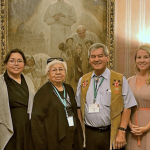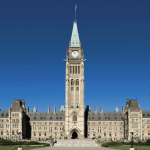Benefitting from over seven months of hindsight, Archbishop Guy Desrochers considers it auspicious that the first liturgical reading he heard in late June upon accepting his appointment to the Archdiocese of Moncton was God calling Abram — later Abraham — to set forth to a new land bravely.
Saying goodbye is, of course, challenging. The Diocese of Pembroke was an ideal episcopal assignment for Desrochers as it was near his family, including his 96-year-old mother.
Desrochers, 67, responded to God’s new call for his life by making an “act of faith,” just like the man God named “the father of many nations.” The Gatineau, Que., native embraced the opportunity to serve the Moncton Archdiocese while being aware of the tribulations faced by this Catholic community for over 12 years.
Officially installed on Oct. 18, Desrochers and his staff had just 72 days to raise $5.4 million to conclude settlement payments for abuse claims between 1955 and 1984. Beforehand, 78 victims had received about 75 per cent of the funds allotted to them over the previous five years. The new shepherd made a promise to the members of his flock attending the welcoming Mass at Our Lady of the Assumption Cathedral.
“I said to the people, ‘look, I will do all my best,’ ” said Desrochers. “‘We are going to try and find the money.’ We had to pay by Dec. 29; otherwise, the opposing counsel would have brought us back into court, and we would have paid between 25 and 50 per cent more.”
Settling these cases has caused significant financial strain. In 2017, Desrochers’ predecessor, Archbishop Emeritus Valéry Vienneau, spoke about the archdiocese possibly being forced into bankruptcy. In September, a $900,000 bank loan was taken out to finance operations.
But, using the words written by Desrochers in a recent letter to the faithful, “a true miracle of providence began to manifest itself” in the weeks before Christmas.
Desrochers identified that the best asset he had at his disposal to secure the needed $5.4 million was the extensive network of contacts across Canada and the United States he had amassed throughout 35 years of consecrated life. He sent letters to over 230 potential benefactors in the first week of December.
A small trickle of donations within the first seven days soon gave way to an avalanche of generosity and approximately $4 million was raised in three weeks.
“As I said during my installation on Oct. 18, I was perhaps being a bit presumptuous by saying we would have all the money then, but now that I look back, it was probably like a prophecy,” said Desrochers. “The Lord was preparing the people. I said to them, ‘when everything is paid for, are you also willing to turn the page on all these years of suffering?’ During the abuse cases, all the parishioners and parishes were called upon to give so much money to the archdiocese.”
A curious mind would ask why Desrochers’ letter led to such a bountiful result. He attributes its success to blunt honesty.
“I explained the whole situation clearly,” said Desrochers. “I did not hide anything. Many of them called back or wrote to me, saying, ‘whoa, you bite the bullet in that letter.’ They were touched by my honesty and that I exposed all the facts of what the archdiocese has been through over 12 years of troubled times.”
By mid-January, the plaintiffs received their claims, the lawyers collected their compensation and the page was turned on this odyssey.
Ushering in a new era will require the Archdiocese to rebuild its assets to ensure operations and pastoral work receive solid monetary support. One strategic measure is raising the diocesan tax from eight to 14 per cent. Other capital-building initiatives will be announced later this year.
Renewal is another crucial goal for 2024. Desrochers is finalizing a 12-member evangelization team — which he deems “the most important committee of the Archdiocese” — to steer a three-phase project.
“Prayer, prayer, prayer,” in Desrochers’ words, is phase one of the undertaking. Members of the committee will promote and help institute new prayer groups in every parish.
Phase two is restructuring the archdiocesan pastoral zones.
“We can’t continue functioning as we’ve been for the past 20, 30 years,” said Desrochers. “Now, we are facing a decrease in attendance and churches, and some of those churches are just 10 minutes away from each other in many cases. We can’t keep all of those churches.”
Once the restructuring is complete, phase three of the evangelization plan calls on each parish to institute a revitalization program. The archdiocesan committee will arm every house of worship with the necessary resources to execute its chosen idea.
Friday, February 27, 2026



